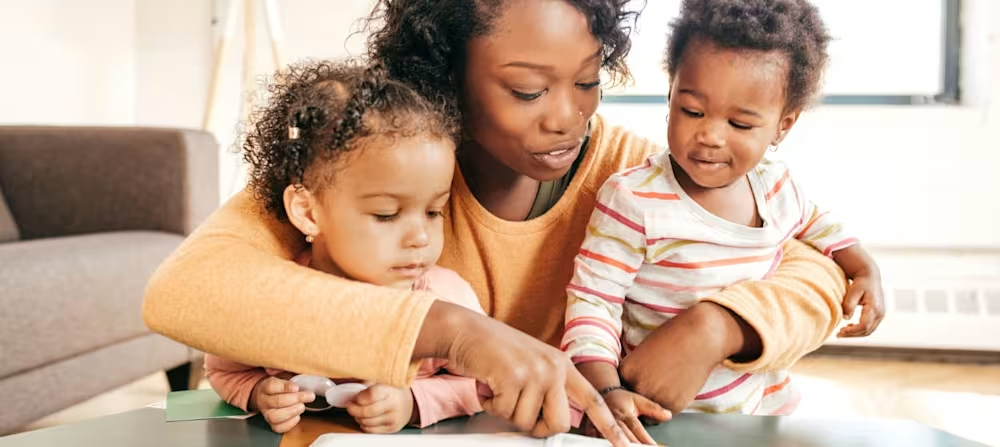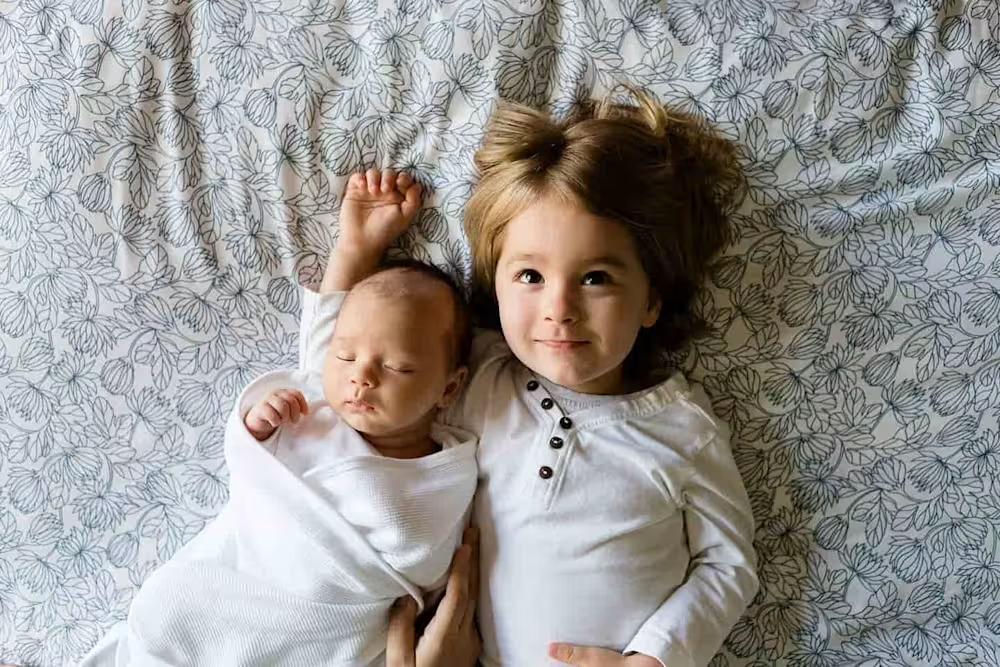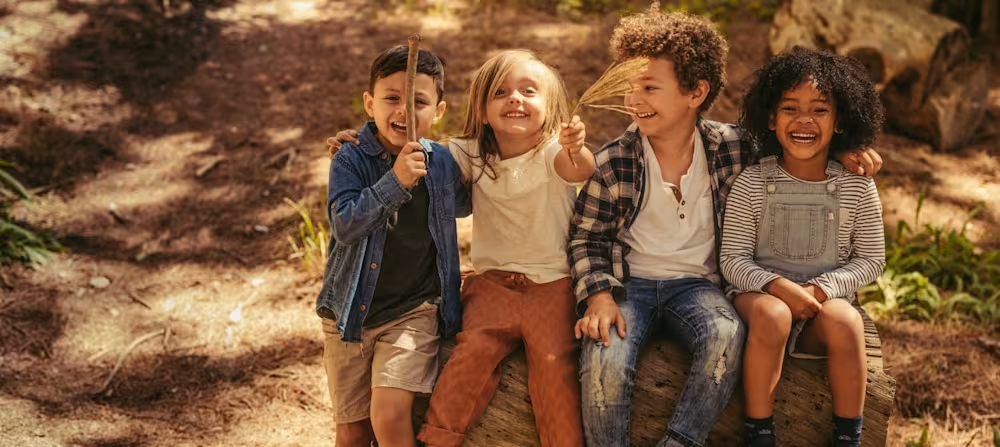How to prepare older siblings for the arrival of a new baby
Updated Dec 30, 2025

Welcoming another baby into the world is easier in some ways — you’ve already been through the sleepless newborn phase and are likely more confident in taking care of a baby. However, having a second (or third or fourth) baby also comes with the challenges of balancing attention between and helping your older kids adjust to life with a new sibling.
While in the long run, your older children will likely love having a little brother or sister, the immediate change that comes with bringing home a new baby can be a bit rocky for some families. It’s important to help older siblings adjust to the changing family dynamics and work to foster a positive relationship between siblings, even though this probably won’t happen overnight.
In this article, we’ll walk you through the possible emotions your older child may experience, how to involve an older sibling before the new baby arrives and give you parenting tips for helping siblings bond after the little one is born.
Addressing emotions with your child
It’s normal for your older child to have big feelings when it comes to being a big brother or sister before the baby is born and especially after. They will likely have a mix of emotions like excitement, resentment, anger, and anxiety. There can also be behavioral changes [], like temporarily regressing in potty training or sleep.
To help navigate older siblings' emotional well-being, try giving them a realistic idea [] of how things will be when the new baby arrives — like the baby will cry a lot and won’t be a playmate for a while. Be honest about the baby not being able to do much at first except eat, sleep, poop… repeat. Setting expectations about how much time and attention [] a new baby requires can be helpful too. And letting them know that the baby won’t be this tiny and needy forever!
Equally important is explaining to your older child that you will love them just as much after the baby is born as you do now — nothing will ever change that. Reassurance is helpful when navigating the emotions that come with anticipating a new sibling. And so is acknowledging your child’s feelings [] about the changes in your family, both positive and negative. Depending on your older child’s age, you may need to help your child put their feelings into words or interpret their behavior accordingly.
Another thing that helps during this transition period is spending special time together [] before the baby is born. Establishing a ritual — even something as simple as reading a book together before bed — that you can do before and after the new baby arrives can help older siblings feel secure and reassured about your relationship.
Note that age and temperament both factor into how your child may react to the arrival of a new little bundle of joy. Children between the ages of 1 and 2 will likely not understand [] much of what it means to have a new sibling. Talk about the new baby with enthusiasm — excitement is contagious at this age! It may also help to read books and look at pictures of babies.
Preschoolers between 2 - 4 are likely still very attached to their caregivers and may not want to share you with a new family member. For this age group, be honest about what having a new baby brother or sister will be like and offer them extra reassurance and attention to ease the transition that will occur with the arrival of the new baby.
If you have a school-age child who’s over 5, they will probably understand the concept of a new sibling and not be as threatened by it as younger children are. However, your older child may still be jealous of the attention the newborn receives. To help children over 5 adjust to being a big brother or sister, explain what’s happening in a language they can understand and be upfront about how a new baby will impact the family dynamic. Remind them that babies are fun and cute but they also require a lot of attention and help from parents.
Involving older siblings in pregnancy
Before the baby is born, pregnancy involvement for older siblings can make them feel included and help with jealousy management. Try activities like bringing them shopping to pick out baby items and let them choose a special outfit or toy for the baby. Some parents bring their older children to prenatal appointments if possible.
At home, try things like showing your older child their own baby pictures []. Talk about how much they have learned and grown since they were that small! Children often love hearing stories about themselves when they were babies.
As much as possible, spend one-on-one time [] with your child and try to keep their routines and transitions consistent before welcoming a new baby. This can help them feel secure and stable once there’s a newborn at home. It’s normal for children to be excited and anxious about becoming a big brother or sister and you can help them express these emotions [] through activities like play, drawing, music, etc. Be sure to give them plenty of praise for positive behavior too!
Tips for the arrival of the new baby
Tip #1: Avoid transitioning your older child out of their crib for baby
While it may be tempting to transition an older child from their crib so you can use it for the new baby, doing so can make a big sibling feel displaced. Note that transitioning to a too early can also lead to sleep issues.
If this is a necessary step for your family, try to time this change to a few months before the baby is born so it’s not directly connected to the timing of their arrival. It’s helpful to keep routines and your child’s personal space intact as much as possible in the time right before and after a big change in family dynamics.
Tip #2: Maintain special one-on-one time with big siblings
Keeping your special bond intact with your older child once the baby is born can help ease the transition for older siblings. One way to do this is by making time to preserve routines (like ) and one-on-one time with them as much as possible so they don’t feel left out [] or forgotten. Taking a little time out each day to make them feel connected to you can help remind siblings that you still have a special relationship even though your family has grown.
Tip #3: Try to time other big transitions before or well after baby’s arrival
Welcoming a new sibling is a big transition for children so try to avoid other big changes around this time too if possible. Additional changes like starting preschool, transitioning to a big kid bed or different bedroom, and weaning from the breast/bottle/pacifier, etc. can be more difficult if timed with the arrival of a new baby.
Learning new skills via potty training or sleep training can also be more overwhelming [] during this time. Consider making these changes months before or after the baby is born.
Tip #4: Prepare for being away from home.
If you’re having a hospital birth [], it’s important to prepare your child as much as possible for your time away from home. Not only will you bring home a newborn, you’ll be gone for a few days as well. This temporary separation can be hard and confusing for siblings, especially if they’re on the younger side and they haven’t spent many nights away from you in the past.
Try to explain to your child that you’ll be gone for a few days and will come back with a new baby. Let them know who will be taking care of them when you’re gone and when they will be able to meet the baby.
If possible, have your older child come to the hospital to meet their new brother or sister. If this happens, it can be helpful for someone else [] to hold the new baby so you can give affection to your older child. Then introduce your older child to their new baby brother or sister.
Tip #5: Use relatable tools to help older siblings prepare for baby
You can also help older children prepare for a new sibling using toys, books, and TV.
A great way to do this is by giving your child a doll to take care of that’s “their” special baby []. Having a doll also helps them practice skills like holding the baby and supporting their head before the arrival of your newborn. Make it fun and exciting!
For younger kids, try books like Spot’s Baby Sister, the I Am a Big Brother and I Am a Big Sister books, and My New Baby. Preschoolers and older children may enjoy books like Little Dragon and the New Baby, Big, and Little Miss, Big Sis.
There are also TV episodes that address welcoming a new sibling that can help your child understand the concept in engaging, age-appropriate ways. Shows like Arthur, Daniel Tiger’s Neighborhood, Cocomelon, Peppa Pig, and Bluey all address this big change.
Creating a sibling-bonding plan
Once your new baby comes home, there are plenty of things you can do to foster sibling bonding from the beginning.
Include the older sibling in activities & routines.
Encourage your older child to bond with the baby by including them in newborn care activities like bath time, getting dressed, pushing the stroller, etc. Responsibilities for older siblings should be simple — you want the activities to feel like special moments for the older child, not chores. Make sure to take cues from your child too.
It’s great to include your child in the baby’s routines but also give them their own space [] and special time outside of it. Set up an area with toys and things they don’t have to share with the baby.
Exchange gifts between siblings.
One popular way to do this is to have the new baby and older child exchange gifts []. Your older child will likely feel special when they help pick out their little brother or sister’s gift. Of course, you’ll need to facilitate a gift “from” your newborn. Depending on your older child’s age, they may or may not understand that the present isn’t actually from the baby. It seems silly, but gifts are exciting!
Encourage loved ones to give attention and gifts to older siblings too.
Encourage friends and family to help make older siblings feel secure and loved too. This may look like greeting them before making a big deal about the new baby or bringing small big brother or big sister gifts for your older children [] so they don’t feel left out.
If you don’t feel comfortable asking guests to do this, you could keep a couple of small wrapped gifts handy so your child has something to open when the baby receives a present. In these early days, your older child will likely be craving special attention, validation, and family support so remind visitors to pay attention to your older child too, not just the baby!
Anticipate highs and lows.
The transition can be hard for an older child, but also keep in mind having siblings can teach children how to cooperate [], build empathy, and create a connection that lasts a lifetime. There may be plenty of crying and bickering in the years to come — and hopefully joy too.
Takeaway
Involving your child in activities before the baby arrives can help them feel important and included. Some examples include taking them shopping for baby items, bringing them to prenatal appointments, and talking about when they were a baby. Allow your child to express their feelings through age-appropriate communication and prioritize one-on-one time with them as much as possible before your baby is born.
It’s normal for older children to feel excitement, resentment, anger, and anxiety around the new baby’s arrival. These emotions will likely ebb and flow before and after your child becomes a big brother or sister. To help manage these feelings, it’s helpful to honestly talk about the changes that will likely occur when the baby arrives and reassure your older child that you love them unconditionally.
To help your child bond with their new little brother or sister, try letting your older children help with the baby by performing age-appropriate tasks that make them feel important and included. Take cues from your child though! Try not to make these activities feel burdensome. Also, be sure to give your older child their own space and attention separate from the baby. Balance can be key here for a positive sibling relationship.
Navigating a new baby into your family is often challenging and emotional for everyone. Note that this transition requires patience, understanding, and setting a good foundation for your children to bond. It won’t happen overnight, but once the chaos subsides, chances are your children will be happy to have each other!
Share article:
Note: The content on this site is for informational purposes only and should not replace medical advice from your doctor, pediatrician, or medical professional. If you have questions or concerns, you should contact a medical professional.
8 Sources
Share article:









